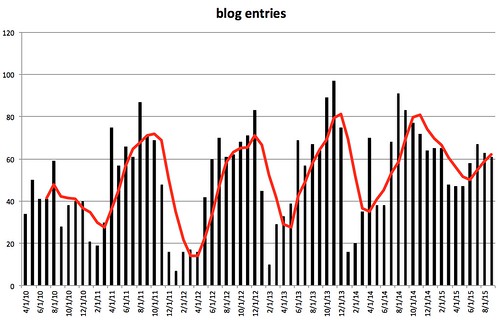What about television? The movies? Or, even, heaven forefend! the book? But then, what is a mind that it can be wrecked, or not?
The brain we know about, and what rots it. Cancer rots the brain. So do drugs of the wrong kind, and there are lots of wrong kinds, though there’s some dispute on specific drugs. But the mind, it’s not at all clear that the mind is the sort of thing that can rot, at least not literally. Metaphorically, sure.
But why would I even entertain the idea – and that’s all I’m doing, entertaining it – that the internets have wrecked my mind? Well, for one thing, I’m a mature adult and for several years now I’ve spent several hours a day, every day, not only working at my computer – which, in some uses is no more than a glorified typewriter – my cruising the web. And I rarely read an article all the way through. I’ll read a couple of sentences, maybe a few paragraphs, and then move on. In some cases I’ll link the article to my Facebook page or even cut, paste, and comment a post to my home blog, New Savanna.
And then I’m back on the prowl, checking out my Facebook friends, seeing how many hits I’ve gotten at Flickr, how’s the conversation over there at Crooked Timber?, any useful stuff at 3 Quarks Daily?, what’s the gossip on JCList? And so it goes. For hours. Everyday.
And you can’t even write a proper sentence! What kind of sentence is that: “For hours”? Where’s the verb? The subject?
Chill, dude. That’s not a sentence. It’s a mind fart.
Mind fart!? What kind of language is that for an intellectual publication like 3QD!
Dude, 3QD is on the internets, yo!
You see the problem/evidence, don’t you? Distracted. Can’t hold a line of thought for more than a minute or three. Sure signs of internet-induced mind rot.
I mean, it used to be that I’d read several books a week. I am, after all, a Ph. D. scholar in English literature. Do you know how many books you have to read, cover-to-cover (no Cliff’s Notes), to get that kind of degree? Lots and lots. What’s worse you have to think about what you’re going to say in seminar even as you read the (damn) book.
Do you have any idea what that’s like, you’re knee deep in Wuthering Heights – forget Heathcliff, he’s no good for you! – and you pause to make a note in the margin – man hangs dog – so you’ll have something to remark about for seminar. Except it’s hardly ever necessary. Like, the idea of seminars is you discuss things. [We’re not undergraduates now, getting lectured at by the Great Scholar.] But that’s not how it worked.
How it worked is that you read the book for the week, plus a critical essay or three, get prepared to say something, and then you sit around the table, you and half-a-dozen to a dozen other graduate students. You just listen to the professor ramble on and on and on for an hour-and-a-half. Then maybe there’s fifteen measly minutes of discussion. If that.
And the guy – it was mostly guys, in my case, it was all guys, though there WERE women in the department – doesn’t really prepare. It’s like he’s got this captive audience and by gum he’s going to try out his latest ideas on us. Why? Because no one hardly ever gets feedback on journal articles and convention presentations are hopeless. These graduate students are my only chance for a live audience.
But I digress. This is about me, and my distractions, not my long-ago professors and their thwarted desires.
As I was saying, however many books I’ve read in the past, I hardly ever read a book cover-to-cover these days. I figure I’ve read 2/3rds, maybe 3/4ths, of Peter Gärdenfors, The Geometry of Meaning. That’s about natural language semantics, a long-standing interest of mine, and very good. Essential, I’d say. But I didn’t need to read the whole thing, at least not now. Maybe later. I think I read all, or at least 90% of, Tim Morton’s Hyperbobjects. Lot of markings in it. Reviewed it right here in 3QD. Good book, very good book. Not quite my cup of tea, but then I’m not the measure of all things, am I?
And I’m damned sure I read all of Matt Jockers, Macroanalysis. Not only read, but studied it. Blogged up a storm about it. Mentioned it here in 3QD as well.
So that’s three books in the last few years. And big hunks of Alex Mesoudi, Cultural Evolution: How Darwinian Theory can Explain Human Culture and Synthesize the Social Sciences. [Really? All that in one 250-page book? That’s frightfully ambitious, no?]
That’s not much for a professional – if unemployed – humanist. Not over the course of two or three years!
There’s no fiction in there, and me, a scholar of literature! A year or so ago I started out to blog my way through Goethe’s Faust. I’d read it my freshman year in college (Johns Hopkins). Took a course on it. Wonderful book, great teacher, Harold Jantz. Markings all through the book.
But I was only able to blog my way through the first part. I just wasn’t interested in the rest. Though, who knows, I may return to it. One of these days.
And it’s a classic.
I’ve binge-watched Breaking Bad, House of Cards, and most recently, Narcos. I just purchased Mad Max: Fury Road from iTunes so I can watch it again (which I did last Thursday evening) and again. Perhaps I’ll even study it, and the various “making of” extras. But Faust? Not so much.
You see why I’m entertaining the idea that the internets have rotted my brain? I’m not doing the things I used to do, the literate things, the book culture things. I’m watching movies, and YouTube. Lots of YouTube. Mnozil. Japanology. Victor Borge. Count Basie. And on and on.
But it’s only entertainment. I don’t really think my mind has rotted – though I suppose there are those who think it’s never been anything but. I’m just not doing the things I used to do. The web is mixed in with this, but I can’t really blame it all on the internet.
There was a time, long ago in the 1970s, when my father told me that he didn’t like to read as much as he’d used to. Really couldn’t finish a book. He was a reader. Had inherited lots of books from his father. Read to me when I was a kid: Treasure Island, Huckleberry Finn, Moby Dick – now that I think of it, I suspect he skipped some sections of that one. The classics, books he’d read when he was young. I loved those bedtimes.
By the early 70s he was in his early 60s and couldn’t read like he’d used to. [And why he remark on that to me?] He’d retired by this time and I was in graduate school. Figured maybe he just wasn’t reading the right books. Got him a copy of Humboldt’s Gift, later Ironweed. Don’t think he ever read them.
At the same time, much to my surprise, he seemed to spend a lot of time each day playing solitaire. Solitaire! Why? Though I didn’t know it at the time, it seems that a lot of workers have trouble adjusting to retirement and so, as this article in The New York Times indicates, those who can afford it now hire professional retirement coaches to help them make the transition.
Could it be when you’ve spent so much of your adult years in work mode, that you have trouble getting out of it when you no longer have to work? That would explain my father’s apparent addiction to solitaire, which lessened over time, though he did play it until the end of his life over two decades after he’d retired. Is that – decades of work – what had bled him of his love for reading?
I don’t know.
But that won’t explain why I seemed to have lost interest in reading books and, in particular, in reading fiction. For, while I have worked off and on my entire adult life, it WAS off and on. However, I’ve also pursued my intellectual interests, off and on, and more on that off in the last decade. [I was once upon a time employed as an academic. But that was long ago, though not so far away.] I haven’t spent such a large portion of my adulthood doing someone else’s bidding, 9 to 5, five (sometimes six) days a week, 50 weeks a year. As recently as five years ago I read a fair amount and for hours at a time.
Now, as I’ve said, not so much.
But I’ve watched a lot of movies and TV, mostly at home though Netflix, at first through the mail (DVDs), more recently online streaming. There was a period of several years where I watched a lot of animation (aka cartoons), mostly but not entirely, anime.
See, I told you. Brain rot. TV’s rotted your brain.
Bullshit! My brain’s just fine.
The seductions of the visual have made you lazy. Dulled your critical capacities.
Have not!
What’d I tell you?
Yet if my brain’s rotted then how is it that in the last five and a half years, since I started New Savanna, I’ve posted almost 3500 entries to the blog? To be sure, a lot of them are just photos with little or no prose. But some of them have been substantial written pieces.
It would appear that even as I’ve lost interest in reading, I’ve become more intellectually productive. Is there a causal relationship between the two? I don’t know. But you can’t write as much as I have over the past five years with a rotted brain. Regardless of exactly what I write, the activity itself demands sustained attention for several hours a day, from one day to the next. Sometimes in the middle of the night and in the early morning. Can’t control the urge to write.
Here’s the interesting thing. Look at this chart, in which I’ve plotted my monthly blog entries since I started New Savanna:
It’s a very spiky pattern, with the dips happening in the winter months. Ever since I went away to college winter has been a down time for me. Am I afflicted with seasonal affective disorder? I don’t know.
Look at the recent end of that chart (to the right). There is a dip, but it’s not nearly so deep as in previous years, and the lowest three months aren’t in the winter, but in the spring and early summer. Wrong season. The pattern seems to be different.
And yet, I’m not all that interested in reading long pieces. Not fiction, nor all that much non-fiction. I read what I need to read so that I can write what I want to write.
My best guess is that I’ve moved into a different phase of life, one where intellectual productivity is taking precedence over absorbing what others have written. Those seasonal down times – an informal term I prefer to the more clinical “depression” – have been I take my mental ship into dry dock, as it were, and refit here, maybe even rebuild her, top to bottom, stem or stern. I’ve spent a adulthood of rethinking what I’ve learned in the past year. And now I’m moving from an annual cycle of building and rebuilding to one of … one of what? Building and building and building?
Maybe.
Don’t really know.
It’s just started.
We’ll see.









